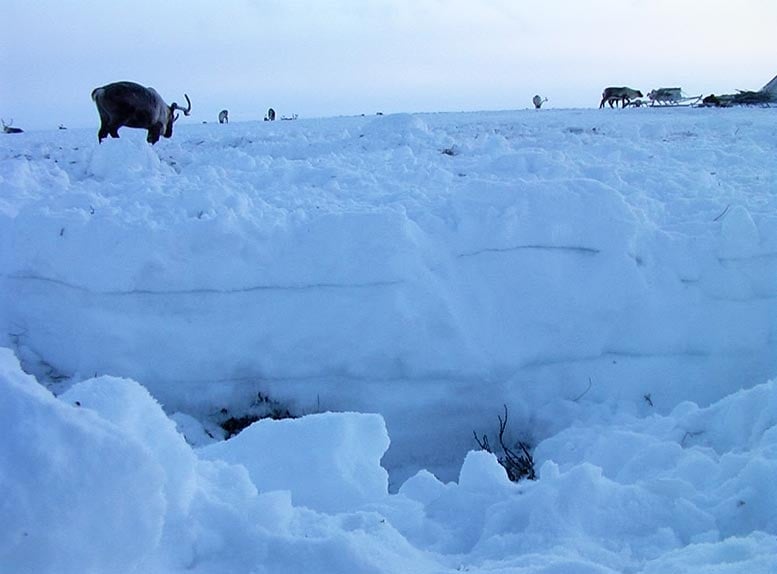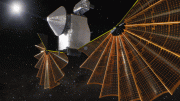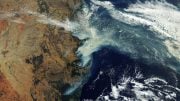
Two layers of ice in deep snow following the rain-on-snow events of November 2006. Credit: Photo courtesy of Florian Stammler
Changes will happen decades earlier than previously thought.
More rain than snow will fall in the Arctic and this transition will occur decades earlier than previously predicted, a new study led by the University of Manitoba (UM) and co-authored by scientists at the National Snow and Ice Data Center (NSIDC) at CU Boulder reports.
Projections from the latest models, published by an international team of researchers led by UM in the journal Nature Communications, show a steep increase in the rate and range of precipitation expected to fall in the Arctic, and that most of these future events will be rain. This shift is occurring due to rapid warming, sea ice loss, and poleward heat transport in the Arctic.
“People might say, ‘Well, what has that got to do with me?’ Well, this is going to affect you, and in actual fact, it is affecting you now.”
“There are huge ramifications of these changes, which we note in the paper, such as a reduction of snow cover, increased permafrost melt, more rain-on-snow events, and greater flooding events from increased river discharge, all of which have implications on wildlife populations and human livelihoods,” says lead researcher Michelle McCrystall, a postdoctoral fellow in UM’s Centre for Earth Observation Science in the Clayton H. Riddell Faculty of Environment, Earth, and Resources.
This transition to a rain-dominated era in the Arctic is forecasted to commence at different times depending on the season and region. In autumn, for instance, these new models predict the shift to occur between 2050 to 2080, whereas the old models predicted this to occur between 2070 to 2090. And in what could be considered a harbinger, as these researchers were preparing their report, in August of this year rain fell for the first time in recorded history on the highest point of the Greenland ice sheet.
“The fact that we’re getting rainfall on the summit of Greenland right now, and that we’re maybe going to get more rainfall into the future––it kind of staggers me,” McCrystall says. “And when we talk about this happening in 2100, it seems like such a long time away, but it’s only 80 years. That’s the next generation. And if we continue the trajectory that we’re going, a lot of issues might happen even faster than what we’ve projected.”
The paper, “New climate models reveal faster and larger increases in Arctic precipitation than previously projected,” warns that reduced snow cover will further exacerbate Arctic and global warming through albedo feedbacks, increased winter carbon dioxide fluxes, methane releases from soil, and thawing permafrost.
The precipitation change will also affect soil moisture and groundwater, and the underground fungal networks that supports all aboveground flora. And more rain-than-snow events can be devastating to wild caribou, reindeer, and muskoxen populations: The rain may freeze and create layers of ice, inhibiting them from accessing forage buried under snow. But migratory bird populations in the Arctic are expected to do well with these warmer and wetter conditions.
“The issue facing us today is that the Arctic is changing so fast that Arctic wildlife might not be able to adapt,” said Mark Serreze, co-author of the study and director of the National Snow and Ice Data Center. “It’s not just a problem for the reindeer, caribou, and musk ox, but for the people of the north that depend on them as well.”
The research team––which includes members from the University College London, CU Boulder, University of Lapland, and the University of Exeter––note if we can remain under 1.5 degrees Celsius (2.7 degrees Fahrenheit) of global warming, then some of these projected changes (namely the transition to a rainfall dominated precipitation) may not occur in some regions of the Arctic. But if we continue on the current trajectory, which given current global policies means we could reach 3 degrees Celsius (5.4 degrees Fahrenheit) global warming by the end of the century, that this transition will likely occur.
“The new models couldn’t be clearer that unless global warming is stopped, the future Arctic will be wetter; once-frozen seas will be open water, rain will replace snow,” says co-author professor James Screen of the department of mathematics and Global Systems Institute at the University of Exeter.
What this precipitation transition means for sea ice, the dominating landscape feature of the Arctic, is unknown. In short, more rain means more fresh water at the ocean’s surface, which might aid sea ice growth, but more rainfall is associated with more heat, which would decrease sea ice growth.
“People might say, ‘Well, what has that got to do with me?’ Well, this is going to affect you, and in actual fact, it is affecting you now,” McCrystall says. “For me, I think what people need to understand is, we live in a global society where everything is interconnected, and that’s true of the climate. We have a global climate. So, what happens in one region, will affect what happens everywhere else.”
Reference: “New climate models reveal faster and larger increases in Arctic precipitation than previously projected” by Michelle R. McCrystall, Julienne Stroeve, Mark Serreze, Bruce C. Forbes and James A. Screen, 30 November 2021, Nature Communications.
DOI: 10.1038/s41467-021-27031-y
This research was undertaken, in part, thanks to funding from the Canada Research Chairs Program, from NSF Grant NNA 198230, from the European Commission Research and Innovation (CHARTER) and from NERC grant NE/V005855/1.









“And when we talk about this happening in 2100, it seems like such a long time away, but it’s only 80 years. That’s the next generation.”
Next generation? A generation is traditionally reckoned at 33 years. Do the math. Then you may find the noted scientist is exaggerating greatly, and you may rightly wonder, what else is he spinning?
Previous prognosticators predicted the Arctic would be ice-free by 2000 (prediction made in the ’80s), then 2020 (made at the turn of the century). SINCE the North Pole has been ice-free in the past, no doubt this prediction will come true — someday. The important thing, from the perspective of Climate Catastrophism, is to predict that it happens well beyond the expected lifespans of the Believers: that way, you never have to say you’re sorry.
I notice that output of these scary stories has diminished greatly since COP26 ended. Surprise, surprise!
“And if we continue the trajectory that we’re going, a lot of issues might happen even faster than what we’ve projected.”
An objective observer would note that it also might happen even slower! Indeed, no probability is assigned. They also don’t indicate what CO2 scenario(s) was/(were) used for the model predictions. I’m concerned that they are relying on the discredited RCP 8.5 scenario, which is why they don’t mention it.
“… reduced snow cover will further exacerbate Arctic and global warming through albedo feedbacks, …”
They overlook the fact that, in the Winter, the sun is absent in the Arctic. It matters not what the albedo is if there is no sunlight! Even farther south, the sun is low on the horizon and has low heating capability. There will be no functional difference in albedo during the Summer because, except for mountains, there is little snow even now on the Summer tundra. It will be about 15,000 years before the albedo of Greenland changes significantly because the interior ice is sitting in a bowl. “Me thinks she doth protest too much.”
Additionally, at nearly glancing angles, the forward lobe of the bi-directional reflectance distribution function (BRDF) is strong, meaning that the albedo of a diffuse reflector is not a good proxy for the total reflectance. One can look out over a plowed cornfield with stubble, at sunset, and visually confirm that at low angles of solar incidence there is higher reflectance than when the sun is high.
I’m disappointed and concerned that tax money is supporting scholarship of such low quality.
2050 is 29 years from now and 2080 is 59 years from now, so those dates are within the lifetimes of both the present generation of our present 20 year-olds and certainly within those of their children. Of course, it may never happen, and of course it might not happen as quickly as this article suggests but forewarned is fore-armed and perhaps that in itself might indicate why it might never happen if adequate remedial action is taken well beforehand. The fact that the normal average zero-degree isotherm over Greenland and assorted glaciated mountain ranges is now at a higher altitude than it was in 1945, and is still rising in altitude, should be of concern, whatever the finer details of whether it will rain on the Arctic in 2050 or some years later. Given present knowledge, we are talking about the inevitable within 100 years and that should be warning enough.
“Given present knowledge, we are talking about the INEVITABLE within 100 years and that should be warning enough.”
Your argument would be sound if you could prove that the rise in the “average zero-degree isotherm” was truly “inevitable,” and not the current expression of a long-term periodic change, as has occurred frequently in the past. Even so, 100 years is difficult to defend as being critical when linear extrapolations of the current melting rate for Greenland suggest that it will take about 15,000 years to completely melt the Greenland ice sheet. To put that in perspective, the oldest archaeological ruins of past civilizations are less than 10,000 yeas old, with most only dating back about 3,000 years or less. Many Roman and Egyptian ruins along the Mediterranean coast are submerged as a result of tectonic activity. More ‘modern’ buildings in Europe that are still in use are only a few hundred years old.
Show me one of these ‘predictions’ that has actually been right.
I’ll wait…